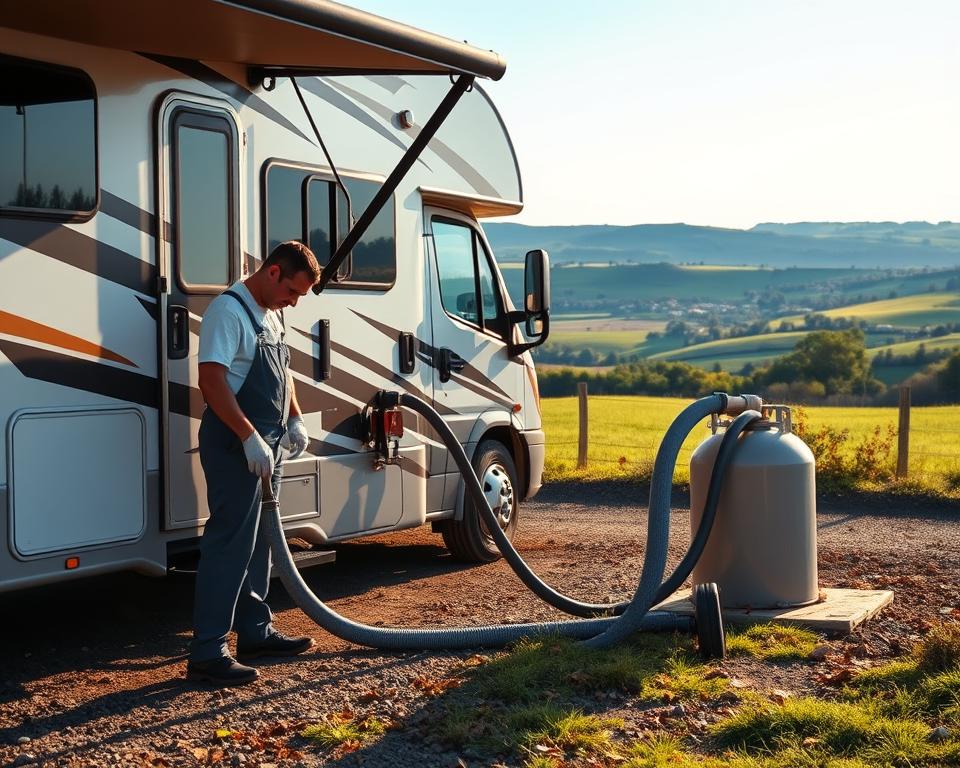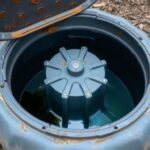Your Guide to RV Septic Tank Service & Care
Curious about what takes place to your RV’s Septic tank when you’re traveling? It’s more than steering clear of nasty odors. Keeping your RV Septic tank properly serviced helps secure smooth travels. A properly cared-for system halts messy incidents and costly fixes. Still, many overlook this critical care. Within this article, we break down the importance for regular mobile RV pump out. We’ll focus on why maintenance matters and provide tips for cleaning your recreational vehicle’s Septic tank. Get ready for worry-free trips!
Core Takeaways
- Regular RV Septic tank service is essential for peak performance.
- Grasping your RV Septic system enables you to sidestep costly repairs.
- Routine maintenance wards off unpleasant odors and clogs.
- Set a pumping schedule matched with your usage.
- Practice best practices for draining your holding tanks.
- Steer clear of common mistakes to extend the life of your Septic system.
- Recognize when to enlist professional help for Septic services.
Understanding RV Septic Systems
An RV Septic system is key for any camper. It contains multiple holding tanks that process waste properly. You’ll find three main tanks in an RV: the fresh water, the gray, and the black tank. The fresh water tank delivers clean water for drinking and cooking. Meanwhile, the gray tank stores wastewater from sinks and showers, ensuring cleanliness. The black tank, specifically for toilet waste, also has a vent to minimize odors.
Preserving a healthy camper sewage system calls for knowing how these parts interact. Routine checks of the tank levels are vital to stop overflow and secure everything runs without a hitch. Getting to know the termination valves is key too. These valves are key in efficiently managing waste disposal. By learning about these components, you can keep your RV in prime form and savor your travels without extra stress.
| Holding Tank | Function | Volume |
|---|---|---|
| Fresh Water Tank | Supplies drinking and cooking water | 30-100 gallons |
| Gray Tank | Stores wastewater from sinks and showers | 30-60 gallons |
| Black Tank | Stores toilet waste | 30-50 gallons |
Why Routine RV Septic Tank Service Matters
Consistent RV Septic tank service is key to keeping your system effective and long-lasting. Without timely maintenance, you could face system failures, nasty scents, and costly repairs—issues that interrupt your adventures.
If you ignore the upkeep of your RV’s Septic system may cause it to back up. This not only affects your RV’s function but also your comfort levels. A clean and properly cared for system is necessary for trouble-free trips, granting you a stress-free travel experience.

Scheduled maintenance extends your sewage system’s lifespan and maintains a clean living space. Watching your Septic tank helps you catch issues early. This foresight saves costs and stress, giving you confidence during your journeys.
How Often to Pump Your RV Septic Tank
Identifying the best schedule for RV Septic tank maintenance hinges on the vehicle’s usage. For those constantly on the road or living in their RVs, it’s recommended to drain the black tank every three-to-five days. This practice ensures cleanliness and prevents unexpected issues during voyages.
Weekend adventurers can generally wait until they return home to pump their Septic tank. Letting waste in the tank too long, though, can cause build-up that hinders the tank’s function and smell control. It’s vital to watch the tank’s level closely, readying for disposal once it hits around two-thirds full to keep everything running properly.
The capacity of your Septic system, along with how you use your RV, will guide when to pump. Understanding these aspects enhances your RV’s performance and cuts the dangers of poor waste management.
| Usage Type | Suggested Drain Schedule | Urgent Pumping Indicators |
|---|---|---|
| Frequent Usage | Every 3-5 days | Level reads 2/3 |
| Weekend Trips | After return home | Bad smells or lazy draining |
| Extended Trips | Every 2-3 days | Visual indicators of fullness |
How to Empty RV Holding Tanks Properly
Properly managing a recreational vehicle’s holding tanks is essential for a comfortable camping experience. Start by draining the black tank first. This strategy lets the gray water to flow through and flush out the hose. Make sure the use of a high-quality sewer hose for a tight connection and to minimize spills. Once the tanks are emptied, thoroughly flushing the black tank is crucial. Using a built-in black tank flush or comparable alternatives can greatly lessen residue.
After the emptying process, it’s vital to close both valves firmly. This action is necessary to maintain a fully operational Septic system. Additionally, RV owners must rely on dump stations properly and follow local laws. Regular cleaning practices for recreational vehicle Septic tanks are key. They protect the system’s optimal functionality and avert future odors.
Preventing Odors and Clogs in Your RV
To manage odors and avoid clogs in your RV, being meticulous is key. The task starts with making sure enough water in the holding tanks. Adequate water assists in breaking down waste efficiently, lowering bad smells.
Picking suitable toilet paper is essential in this process. Opt for RV-safe toilet paper that disintegrates quickly, avoiding clogs. This small adjustment considerably supports maintaining seamless waste flow.
Using enzyme-based treatments can further enhance waste decomposition and odor control. These natural solutions aid keep your RV smelling fresh. It’s also crucial to regularly check vent pipes for obstructions to guarantee good airflow and prevent odors from infiltrating your living area.
Errors to Dodge in RV Septic Maintenance
Keeping your RV’s Septic system correctly is vital for its efficiency and longevity. When non-biodegradable items like wipes or feminine products are flushed, they can cause severe blockages. These blockages can lead to various problems that are challenging to resolve.
Not using enough water when flushing can also hurt the system. It leads to waste buildup, resulting in foul smells and potential damage. Furthermore, a common mistake at full hook-up sites is leaving the black tank valve open. This causes waste to accumulate at the tank’s bottom.
Preventive measures involve routinely flushing and rinsing tanks after emptying them. Skipping maintenance can grow into significant issues necessitating expensive repairs. Being proactive and knowledgeable protects both your RV and your finances.
Signs You Need Professional RV Septic Help
Knowing when to seek professional RV Septic services is essential for keeping a healthy Septic system. Some indicators point to the need for expert intervention. If you notice slow-draining tanks or experience persistent foul odors wafting from your RV, it is prudent to act promptly. These signs often reveal underlying issues that demand a thorough Septic tank service for resolution.
Visible leftover waste after emptying can also show problems within your Septic system. This situation may not clear with routine maintenance and may require the use of specialized equipment. Professionals are prepared to handle complex challenges via tools, such as high-pressure water jets, to ensure a comprehensive cleaning process.
Early professional assistance can make a big difference. Minor troubles can swiftly grow into more severe complications without proper care. Investing in professional RV Septic services protects the integrity of your system and lengthens its lifespan.
| Signs of Trouble | What to Do |
|---|---|
| Slow draining tanks | Contact professional RV Septic services for assessment |
| Persistent foul odors | Schedule Septic tank service for diagnostics |
| Visible leftover waste | Seek immediate assistance from a professional |
| Frequent clogs | Consider expert cleaning solutions |
Ensuring Long-Term RV Septic Health
Long-term care for RV Septic systems requires attention past basic pump-outs. Doing deep cleaning of tanks every few months prevents buildup and extends system life. Examining dump valve seals regularly prevents leaks. Additionally, sanitizing the system keeps it clean and functioning well.
It’s vital to monitor tank sensors to confirm they work correctly. Incorrect readings may result in over-filling, affecting performance. Periodic sensor checks and tweaking maintenance schedules can ward off this problem.
| Maintenance Task | Frequency | Outcome |
|---|---|---|
| Deep Cleaning Tanks | Every 3-6 months | Prevents buildup and clogs |
| Inspect Dump Valve Seals | Monthly | Reduces risk of leaks |
| Sanitize System | Every 6 months | Makes sure system remains clean |
| Monitor Tank Sensors | Monthly | Ensures accurate readings |
Forward-thinking maintenance is central to your RV Septic system’s long-term health. It creates smooth and trouble-free travel experiences.
Why Choose All In Sanitation for RV Septic Needs
All In Sanitation stands out at delivering RV Septic services that fit each client’s distinct needs. Whether it’s regular pump-outs or thorough tank cleaning, they get the essential role of a well-functioning Septic system in your RV’s performance.
Thanks to extensive expertise in RV Septic systems, All In Sanitation offers top-tier guidance on maintenance and care. Their team is knowledgeable in the particular challenges RV owners face and provides effective solutions when troubles arise.
Opting for All In Sanitation allows RV enthusiasts fully engage in their journeys, handing over Septic concerns to a dependable ally. Their dedication to excellent service delivers tranquility and boosts the pleasure of adventures on the open road.
In Summary
Looking after your RV Septic tank is vital for seamless travels. It’s necessary to understand your system and keep up with regular services. This ensures you won’t face unexpected issues on your journey. These key steps cover frequent pumping and adopting sound waste management practices.
Efficient long-term care keeps your system in excellent condition. By implementing the provided maintenance tips, you can boost your travel experience. This strategy prevents expensive repairs later. Bear in mind, avoiding common errors and recognizing when to get professional help are important.
Ultimately, being ahead of the curve in your RV Septic system’s maintenance secures a hassle-free adventure. It lets you to zero in on forming lasting memories. So, embrace these steps to heart and relish your road trips to their fullest.

